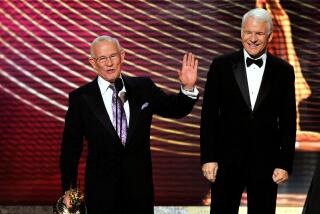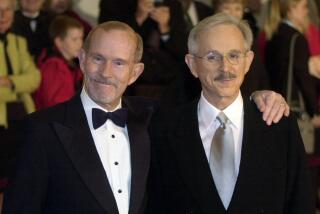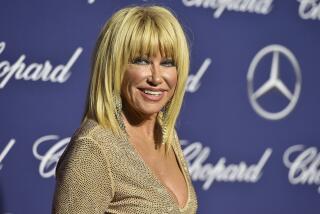After ‘Mummy,’ He Won’t Have to Dig for Work
When Stephen Sommers’ expensive monster movie “Deep Rising” bombed at the box office last year, his phone didn’t ring for a week.
This week, the director’s phone hasn’t stopped ringing. Nor has his agent’s. Producers and studio executives are now clamoring to be in business with the 40-year-old writer-director.
It’s no wonder. Sommers’ ambitious $82-million remake of “The Mummy” for Universal Pictures debuted last weekend as the nation’s highest-grossing film. It took in a whopping $43.4 million--a number so huge it stunned the industry and prompted Edgar Bronfman Jr., head of Universal parent Seagram Co., to place a congratulatory call to Sommers, suggesting the director make more movies for the studio.
It’s also the kind of number that transforms careers in Hollywood.
A commercial success of this magnitude instantly puts Sommers into a different league. For years, he’s toiled as a solid, though hardly “A-list,” director, with credits that include Disney family movies “The Adventures of Huck Finn” and the live-action version of “The Jungle Book.” In a single weekend, he’s become one of the industry’s most sought-after directors.
His current “quote”--Hollywood parlance for the going rate for someone’s services on a project--to write and direct should increase by millions of dollars.
Studio sources say that whereas Sommers got close to $2 million to write and direct “The Mummy,” he stands to make three times that on a sequel and from $4 million to $7 million for other projects.
“I believe that something like this catapults him into stardom as a filmmaker,” said his longtime agent, Todd Harris. “Every studio in town wants to be in business with him. They want a guy who can turn a project into a priority like Steve did with ‘The Mummy.’ ”
As he sipped orange juice and nursed a bagel at breakfast this week, Sommers--who said he’s only been to two Hollywood parties ever--sounded ecstatic but also realistic about his good fortune.
“I’m just glad they’re going to let me make movies again,” said the unpretentious Sommers, whom friends describe as down-to-earth, honest and loyal, and as having an unbridled enthusiasm for his work.
“What this does is give you some breathing room,” he said.
Sommers, who is married and has a 4-year-old daughter, works at home in Pacific Palisades on a rickety wooden desk he bought for $20 when he was a student. He works tirelessly, refusing even to eat until he finishes writing in late afternoon.
Sommers feels that although he’s been lucky to have worked steadily over 11 years and to have had seven screenplays produced (of which he directed five), having a big flop like “Deep Rising” can “suddenly make you realize it could stop any time.”
Which is why he chuckles now when people hail him as an “overnight success.”
Sommers, the eldest of a family of five children, is from the small Minnesota town of St. Cloud. In his early 20s, he spent several years abroad working as a street performer, a rock band manager and a storyteller. He graduated from USC Film School in 1989, gaining attention with his award-winning short, “Perfect Alibi,” which served as his entree to Hollywood.
Cut to last Friday, when “The Mummy,” starring Brendan Fraser and Rachel Weisz, opened. Sommers got a call from his sister, who still lives in St. Cloud, telling him the matinee showing had sold out--something the theater manager told her hadn’t happened since “Jurassic Park.”
When the phone rang at 6 the next morning at his home, Sommers figured it had to be good news. “Why else would someone call that early?” he surmised, noting that the phone hadn’t even completed its first ring “before I was downstairs, across the house, picking it up.”
On the line was Universal President Ron Meyer telling Sommers that the studio was projecting a $44-million-plus opening weekend.
“Up until a few weeks ago, people in the industry thought, ‘Well, it’s a small mummy movie.’ Nobody really knew about it,” Sommers said.
He said when he first wrote the script, Universal production president “Stacey Snider had no interest in the movie. It was about the third or fourth draft that her assistant urged, ‘You’ve got to read this script’ that she read it and realized, ‘Oh, it’s not just a mummy movie--it’s got action, adventure and romance.” After that, Sommers said, “she was right on board.”
But it was Snider and her former co-president of production Marc Platt who had approached Sommers about making “The Mummy,” which producers Sean Daniel and Jim Jacks had been developing at Universal for five years.
Daniel said the project had gone through many incarnations with various writers and directors--including John Sayles and Joe Dante (who teamed on “Piranha”)--but that none was the right take.
“Several scripts were written, including one where the mummy comes to contemporary Los Angeles, and another, contemporary New York,” Daniel said. “At one point, the studio wanted to squeeze it into a low-budget horror movie, and Jim and I always thought the best version was the mummy as a screen character who could be at the center of an event movie.”
That’s what Sommers had in mind.
In a 90-minute pitch to Universal based on his detailed 18-page outline, Sommers said, “I told them right out front that if I was going to do the movie, I’d want to make it a big summer event ‘Mummy,’ ” with special effects by George Lucas’ Industrial Light & Magic.
What Sommers didn’t want to make was a straight-ahead monster film about “some guy limping around wrapped in bandages.”
Being a big fan of Karl Freund’s original 1932 “The Mummy,” Sommers said, he wanted his remake to recapture the essence of that film. “Boris Karloff is only wrapped in bandages for the first two opening sequences,” he said of the film’s star.
When he first saw “The Mummy” on TV as a teenager, Sommers said, he was impressed that “it wasn’t just a horror movie, even though it scared the hell out of me. It was ancient Egypt. Cairo in the ‘20s. It was really exotic, romantic and adventurous.”
His version, set in 1925, follows a group of explorers who stumble upon an ancient Egyptian tomb and unwittingly bring to life a cursed 3,000-year-old priest. Sommers acknowledges that he was inspired by such modern-day films as “Raiders of the Lost Ark” and “Romancing the Stone,” but says it was the swashbuckling old films he enjoyed as a kid that most influenced him.
His all-time favorite director is Michael Curtiz, who made not only “Casablanca,” but also many of the Errol Flynn swashbucklers, among them “Captain Blood,” which Sommers considers “one of the greatest romantic adventure movies ever.”
“The Mummy” was shot in Morocco last summer--which Sommers described as particularly difficult because of the searing desert heat and the fact that every piece of equipment and most of the crew had to be imported from London since there was no film industry in Morocco.
“The movies I make tend to be big, huge pains in the butt,” said Sommers, whose “Jungle Book” was shot in India.
But producers who have worked with him over the years say Sommers is certainly up to the task.
“Steve has so much energy that it made a very difficult shoot some sort of arduous pleasure,” said Daniel.
That’s impressive for somebody who entered film school never having picked up a camera in his life.
“My first night of class, I borrowed a friend’s pocket 8mm Instamatic camera that didn’t even have F-stops, only sun and clouds. And most of the other students had bazookas--these huge techno state-of-the-art cameras.”
Sommers’ background in storytelling and street acting began to pay off, and he quickly learned the technical aspects of filmmaking. He actually got his first Hollywood gig before graduating, writing and directing a small Showtime movie called “Catch Me if You Can.” He then sold a feature script, “Gunmen,” to Disney producers Larry Mark and John Baldecchi. After that, he adapted Mark Twain’s classic “Huckleberry Finn” for the screen. Mark and Baldecchi persuaded Disney Studios’ then-chief Jeffrey Katzenberg to give Sommers a “director’s test”--one day and $20,000 to shoot two scenes. These tests are commonly shot haphazardly on sound stages, but Sommers went all out, urging Disney to let him film at the Disney Ranch.
Needless to say, he got the gig. And a two-picture deal.
That was six years ago.
“Now he’s on top,” said agent Harris. “But it’s about staying there.”
More to Read
The biggest entertainment stories
Get our big stories about Hollywood, film, television, music, arts, culture and more right in your inbox as soon as they publish.
You may occasionally receive promotional content from the Los Angeles Times.










